新概念英语第二册:Lesson72 课文注释
- 格式:docx
- 大小:37.25 KB
- 文档页数:2
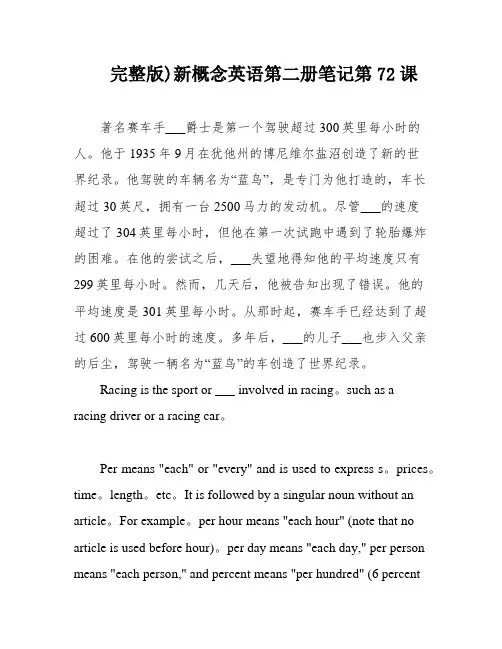
完整版)新概念英语第二册笔记第72课著名赛车手___爵士是第一个驾驶超过300英里每小时的人。
他于1935年9月在犹他州的博尼维尔盐沼创造了新的世界纪录。
他驾驶的车辆名为“蓝鸟”,是专门为他打造的,车长超过30英尺,拥有一台2500马力的发动机。
尽管___的速度超过了304英里每小时,但他在第一次试跑中遇到了轮胎爆炸的困难。
在他的尝试之后,___失望地得知他的平均速度只有299英里每小时。
然而,几天后,他被告知出现了错误。
他的平均速度是301英里每小时。
从那时起,赛车手已经达到了超过600英里每小时的速度。
多年后,___的儿子___也步入父亲的后尘,驾驶一辆名为“蓝鸟”的车创造了世界纪录。
Racing is the sport or ___ involved in racing。
such as a racing driver or a racing car。
Per means "each" or "every" and is used to express s。
prices。
time。
length。
etc。
It is followed by a singular noun without an article。
For example。
per hour means "each hour" (note that no article is used before hour)。
per day means "each day," per person means "each person," and percent means "per hundred" (6 percentis equal to 6 per 100)。
As per is a colloquial n meaning "according to" or "in accordance with," as in "as per n." Per capita means "per person" or "per head" and is used to ___。
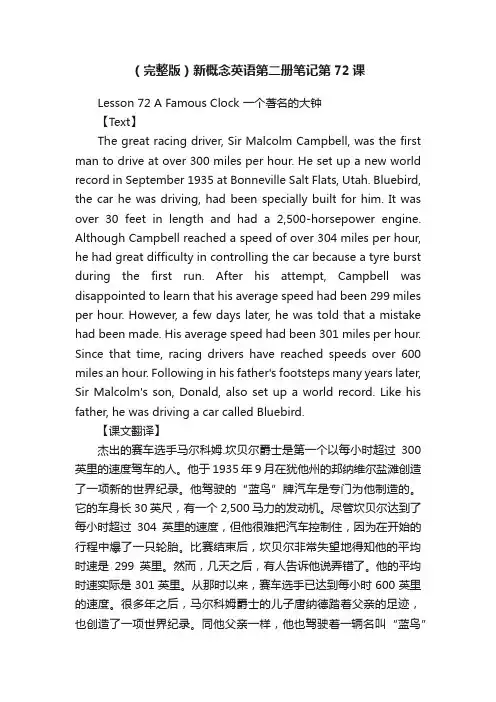
(完整版)新概念英语第二册笔记第72课Lesson 72 A Famous Clock 一个著名的大钟【Text】The great racing driver, Sir Malcolm Campbell, was the first man to drive at over 300 miles per hour. He set up a new world record in September 1935 at Bonneville Salt Flats, Utah. Bluebird, the car he was driving, had been specially built for him. It was over 30 feet in length and had a 2,500-horsepower engine. Although Campbell reached a speed of over 304 miles per hour, he had great difficulty in controlling the car because a tyre burst during the first run. After his attempt, Campbell was disappointed to learn that his average speed had been 299 miles per hour. However, a few days later, he was told that a mistake had been made. His average speed had been 301 miles per hour. Since that time, racing drivers have reached speeds over 600 miles an hour. Following in his father's footsteps many years later, Sir Malcolm's son, Donald, also set up a world record. Like his father, he was driving a car called Bluebird.【课文翻译】杰出的赛车选手马尔科姆.坎贝尔爵士是第一个以每小时超过300英里的速度驾车的人。
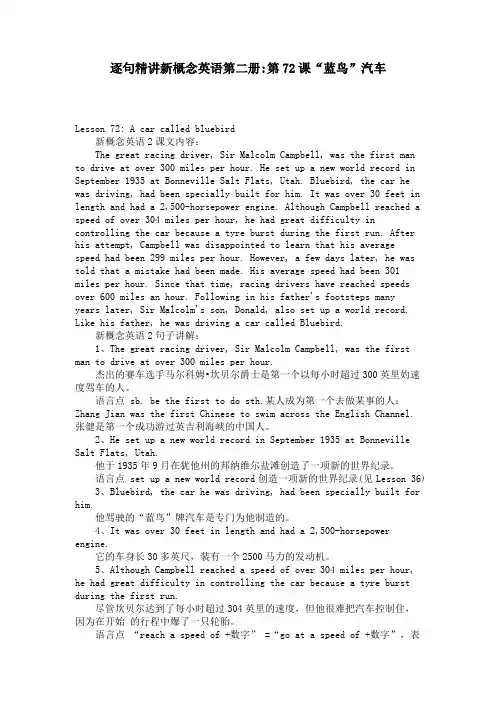
逐句精讲新概念英语第二册:第72课“蓝鸟”汽车Lesson 72: A car called bluebird新概念英语2课文内容:The great racing driver, Sir Malcolm Campbell, was the first manto drive at over 300 miles per hour. He set up a new world record in September 1935 at Bonneville Salt Flats, Utah. Bluebird, the car he was driving, had been specially built for him. It was over 30 feet in length and had a 2,500-horsepower engine. Although Campbell reached a speed of over 304 miles per hour, he had great difficulty in controlling the car because a tyre burst during the first run. After his attempt, Campbell was disappointed to learn that his average speed had been 299 miles per hour. However, a few days later, he was told that a mistake had been made. His average speed had been 301 miles per hour. Since that time, racing drivers have reached speeds over 600 miles an hour. Following in his father's footsteps manyyears later, Sir Malcolm's son, Donald, also set up a world record. Like his father, he was driving a car called Bluebird.新概念英语2句子讲解:1、The great racing driver, Sir Malcolm Campbell, was the first man to drive at over 300 miles per hour.杰出的赛车选手马尔科姆•坎贝尔爵士是第一个以每小时超过300英里妁速度驾车的人。
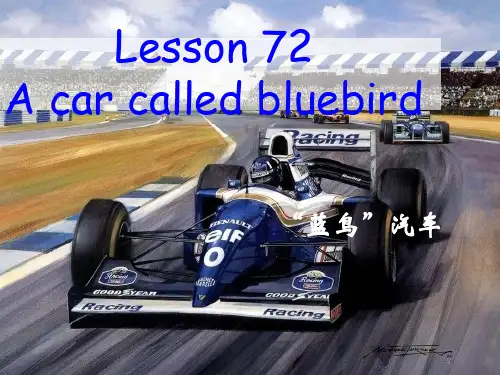
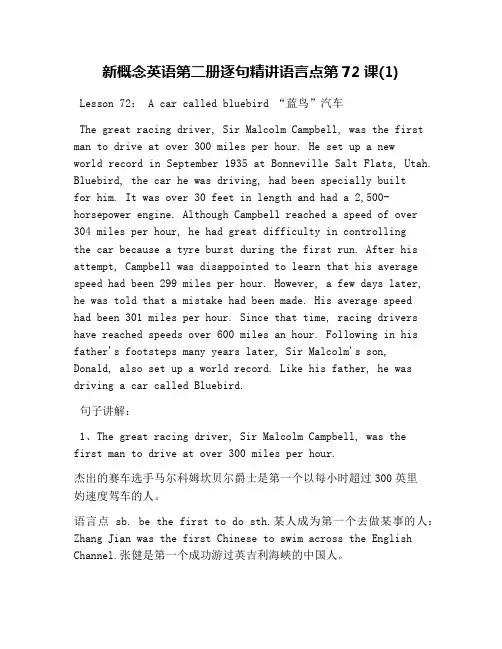
新概念英语第二册逐句精讲语言点第72课(1)Lesson 72:A car called bluebird “蓝鸟”汽车The great racing driver, Sir Malcolm Campbell, was the first man to drive at over 300 miles per hour. He set up a newworld record in September 1935 at Bonneville Salt Flats, Utah. Bluebird, the car he was driving, had been specially builtfor him. It was over 30 feet in length and had a 2,500-horsepower engine. Although Campbell reached a speed of over 304 miles per hour, he had great difficulty in controllingthe car because a tyre burst during the first run. After his attempt, Campbell was disappointed to learn that his average speed had been 299 miles per hour. However, a few days later, he was told that a mistake had been made. His average speed had been 301 miles per hour. Since that time, racing drivers have reached speeds over 600 miles an hour. Following in his father's footsteps many years later, Sir Malcolm's son, Donald, also set up a world record. Like his father, he was driving a car called Bluebird.句子讲解:1、The great racing driver, Sir Malcolm Campbell, was thefirst man to drive at over 300 miles per hour.杰出的赛车选手马尔科姆坎贝尔爵士是第一个以每小时超过300英里妁速度驾车的人。
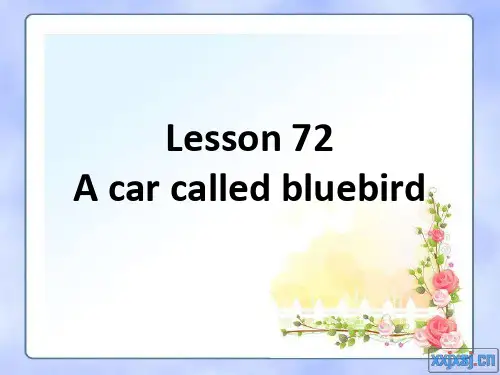
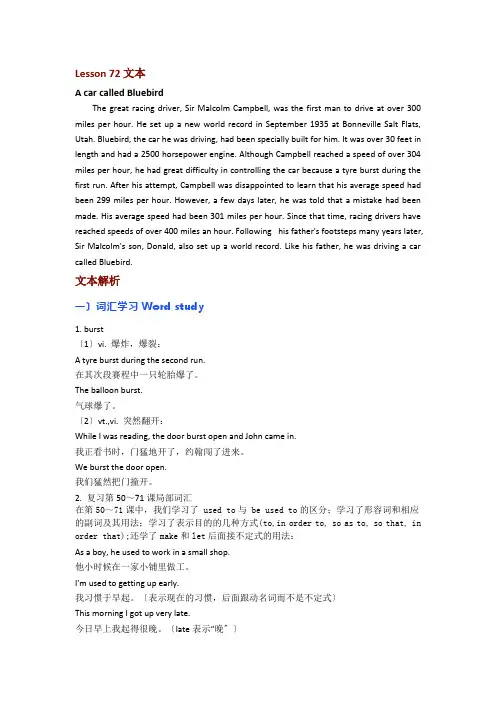
Lesson 72 文本A car called BluebirdThe great racing driver, Sir Malcolm Campbell, was the first man to drive at over 300 miles per hour. He set up a new world record in September 1935 at Bonneville Salt Flats, Utah. Bluebird, the car he was driving, had been specially built for him. It was over 30 feet in length and had a 2500 horsepower engine. Although Campbell reached a speed of over 304 miles per hour, he had great difficulty in controlling the car because a tyre burst during the first run. After his attempt, Campbell was disappointed to learn that his average speed had been 299 miles per hour. However, a few days later, he was told that a mistake had been made. His average speed had been 301 miles per hour. Since that time, racing drivers have reached speeds of over 400 miles an hour. Following his father's footsteps many years later, Sir Malcolm's son, Donald, also set up a world record. Like his father, he was driving a car called Bluebird.文本解析一〕词汇学习Word study1. burst〔1〕vi. 爆炸,爆裂:A tyre burst during the second run.在其次段赛程中一只轮胎爆了。
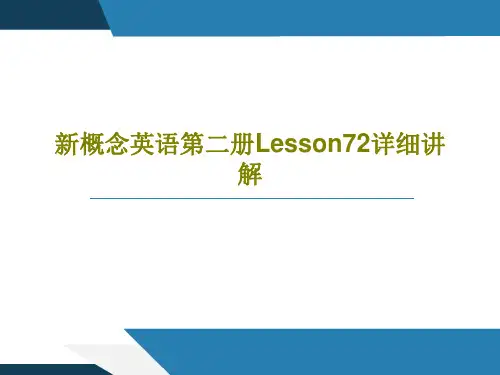
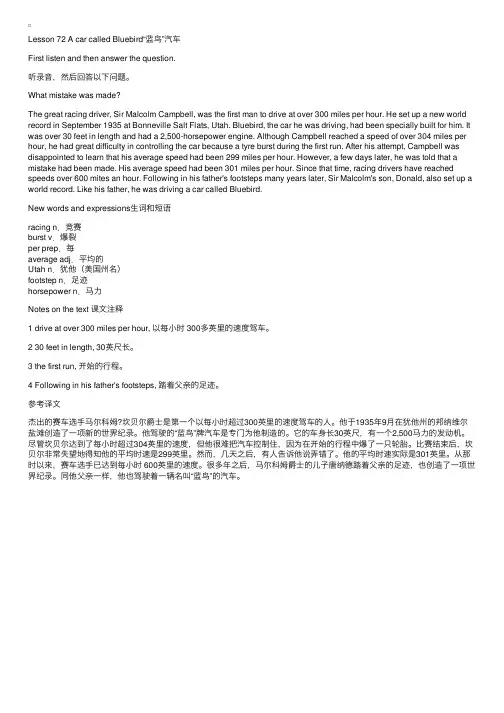
Lesson 72 A car called Bluebird“蓝鸟”汽车First listen and then answer the question.听录⾳,然后回答以下问题。
What mistake was made?The great racing driver, Sir Malcolm Campbell, was the first man to drive at over 300 miles per hour. He set up a new world record in September 1935 at Bonneville Salt Flats, Utah. Bluebird, the car he was driving, had been specially built for him. It was over 30 feet in length and had a 2,500-horsepower engine. Although Campbell reached a speed of over 304 miles per hour, he had great difficulty in controlling the car because a tyre burst during the first run. After his attempt, Campbell was disappointed to learn that his average speed had been 299 miles per hour. However, a few days later, he was told that a mistake had been made. His average speed had been 301 miles per hour. Since that time, racing drivers have reached speeds over 600 mites an hour. Following in his father's footsteps many years later, Sir Malcolm's son, Donald, also set up a world record. Like his father, he was driving a car called Bluebird.New words and expressions⽣词和短语racing n.竞赛burst v.爆裂per prep.每average adj.平均的Utah n.犹他(美国州名)footstep n.⾜迹horsepower n.马⼒Notes on the text 课⽂注释1 drive at over 300 miles per hour, 以每⼩时 300多英⾥的速度驾车。
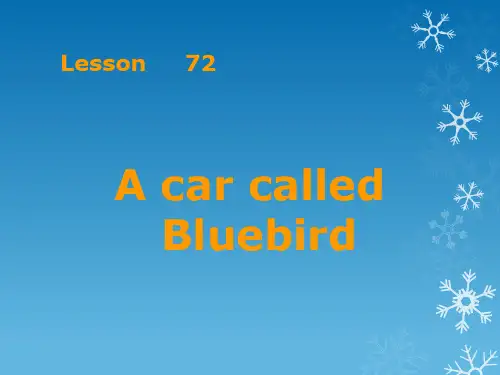
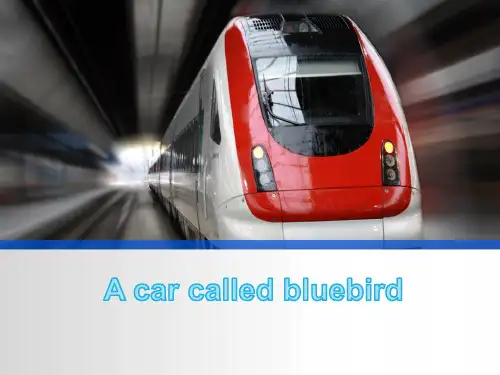
新概念第二册课文翻译及学习笔记【Lesson70、71、72】【课文】During a bullfight, a drunk suddenly wandered into the middle of the ring. The crowd began to shout, but the drunk was unaware of the danger. The bull was busy with the matador at the time, but it suddenly caught sight of the drunk who was shouting rude remarks and waving a red cap. Apparently sensitive to criticism, the bull forgot all about the matador and charged at the drunk. The crowd suddenly grew quiet. The drunk, however, seemed quite sure of himself. When the bullgot close to him, he clumsily stepped aside to let it pass. The crowd broke into cheers and the drunk bowed. By this time, however, three men had come into the ring and they quickly draggedthe drunk to safety. Even the bull seemed to feelsorry for him, for it looked on sympatheticallyuntil thedrunk was out of the way before once more turning itsattention to the matador.【课文翻译】在一次斗牛时,一个醉汉突然溜达到斗牛场中间,人们开始大叫起来,但醉汉却没有意识到危险。
【导语】新概念英语作为家喻户晓的经典之作,它有着全新的教学理念,有趣的课⽂内容及其全⾯的技能训练,为⼴⼤的英语学习者提供帮助!如果你也想学好英语,⼜怎能错过新概念英语?下⾯为您提供了相关内容,希望对您有所帮助!新概念英语第2册Lesson70课⽂详注 1.…the drunk was unaware of the danger.……醉汉没有意识到危险。
While she read the book, she was unaware of the noise around her. 她看那本书时没有觉察到周围的噪⾳。
I was unaware that you were coming. 我不知道你要来。
2.it suddenly caught sight of the drunk,突然它看见了醉汉。
catch sight of是个固定短语,意为“看见”、“发现”: As I came out of the shop, I caught sight of Dan in the crowd. 当我从商店⾥出来时,我在⼈群中看到了丹。
3.sensitive to criticism,对挑衅/批评敏感。
sensitive表⽰“敏感的”、“神经过敏的”、“易⽣⽓的”或“介意的”等,通常与to+名词连⽤,也可作定语: Mary is sensitive to smells. 玛丽对⽓味很敏感。
Mary has a sensitive ear. 玛丽的⽿朵很灵敏。
You're too sensitive. 你太敏感了(太容易⽣⽓了)。
4.The drunk, however, seemed quite sure of himself.可这醉汉像是很有把握似的。
be/ feel sure of oneself 表⽰“有⾃信⼼”: She's always so sure of herself. 她总是这么⾃信。
新概念第二册Lesson 72 A car called Bluebird一、单词精讲racing['reisiŋ] n.竞赛引申:可引申为竞争、角逐的活动或状态,不局限于速度方面的竞赛,例如“political racing”(政治角逐)。
搭配:racing car(赛车);horse racing(赛马);racing track(赛道)。
例句:Racing for the championship title is extremely intense among the top teams.(顶级球队之间争夺冠军头衔的竞赛极其激烈。
)per [pə:]prep.每引申:还可引申为根据某种比率或比例的概念。
搭配:per week(每周);per month(每月);per cent(百分之……)。
例句:They produce 1000 units per week.(他们每周生产1000个单位。
)Utah['ju:tɑ:] n.犹他(美国州名)引申:可引申为与犹他州相关的文化、地理特征等,如Utah's unique landscape (犹他州独特的地貌)。
搭配:Utah Jazz(犹他爵士队,美国篮球队名)Utah desert(犹他沙漠)例句:Many tourists go to Utah to enjoy its natural beauty.(许多游客去犹他州欣赏其自然美景。
)horsepower['hɔ:sˌpauə]n.马力引申:可用于形容力量的大小,如“a person with great horsepower”(一个力量很大的人,这里是比喻用法)。
搭配:engine horsepower(发动机马力)rated horsepower(额定马力)。
例句:This car has a high - horsepower engine.(这辆汽车有一个高马力的发动机。
Lesson 72 A car called Bluebird一.【词汇和短语】翻译下列句子。
1. racing ucn. 竞赛(运动或职业)常做定语a racing driver a racing carrace 1)cn. (速度)竞赛horse race boat race car race2)n. 人种,种族the white race the yellow race the race problem the human race3)v. 和…赛跑,参加竞赛2. per prep.3. horsepower n. 马力(外来词常用意译或音译)eg. honeymoon White House Coca Cola sofa chocolate London4. burst v. 爆炸,爆裂(burst-burst-burst)eg. The balloon suddenly burst. The tyre burst.burst into tears突然大哭起来burst into laughter突然大笑起来burst into cheers突然欢呼起来5. average adj. 平均的average age/acore/speedadj. 一般的average student 中等生6. footstep cn. 足迹,脚步,脚步声eg. I heard her soft footsteps on the stairs.footprint n. 脚印footnote n. 脚注Exercise:(1)In fact, studying is a race against time. 事实上,学习就是和时间赛跑。
(2)You can stay at the hotel at 10 dollars per person per night. 你们可以每人每晚花10美金住这家旅馆。
(3) (burst)我正看书时,门猛然地开了,john闯了进来。
新概念英语第二册:Lesson72 课文注释
【篇一】
The great racing driver, Sir Malcolm Campbell, was the first man to drive at over 300 miles per hour. 杰出的赛车选车马尔科姆·坎贝尔爵士是第一个以每小时超过300英里的速度驾车的人。
(1)to引导的不定式短语为 the first man的定语。
类似的可用于这种句型的词语有the second, the next/the last以及表示级的如 the best, the most intelligent等。
这些词语后面能够接名词或one(s),也能够不接:
Shes always the first to arrive and the last to leave.
她总是第一个来到,最后一个离开。
Youre the best person to advise me about buying a house.
你是我买房子的顾问。
the only后必须接一个名词或 one(s):
Youre the only pereson/one to complain.
你是惟一抱怨的人。
(2)per表示“每一”、“每”,通常用于商业及技术用语,日常用语大多用 a/an:
You can stay at the hotel at£ 10 per person per night.
你们能够每人每晚花10英镑住在这家旅馆。
You must have been driving at seventy miles an/per hour.
你刚才一定是以每小时70英里的速度开车。
【篇二】
…he bad great difficulty in controlling the car because a tyre burst during the first run.……他很难把汽车控制住,因为在开始的行程中爆了一只轮胎。
(1)difficulty 表示“难”、“困难”时为不可数名词。
表示做某事有困难时能够用 have difficulty(in)doing sth. 结构, in通常可省略:
Gary has grown a beard and I had difficulty (in) recognizing him.
加里蓄了胡子,我很难认出他来。
(2)run在这里为名词,表示“(赛跑的)路程/行程”:
The next run is forty miles.
下一段赛程为40英里。
【篇三】
Following in his fathers footsteps…踏着父亲的足迹…… follow in sb.s footsteps为固定短语,表示“步某人的后尘”、“仿效某人”或“继承某人的事业”:
He intends to follow in his father/ uncles footsteps and to become a dentist.
他打算继承父亲/叔叔的事业,当一名牙医。